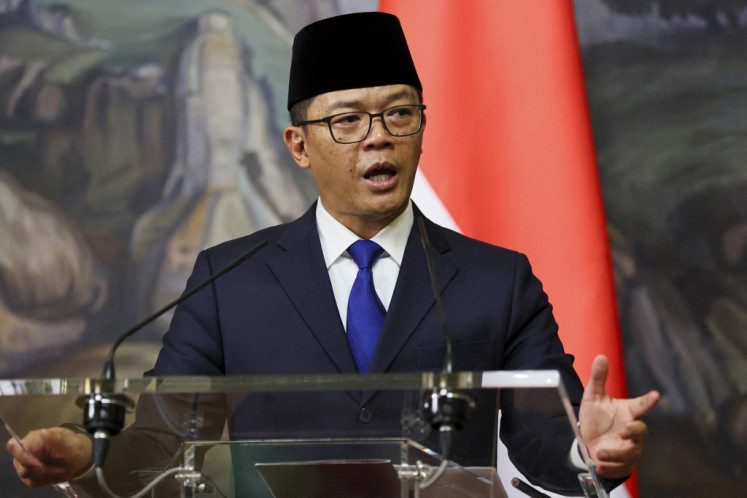Popular Reads
Top Results
Can't find what you're looking for?
View all search resultsPopular Reads
Top Results
Can't find what you're looking for?
View all search resultsWrapping Christmas
Celebrating Christmas without thinking about giving gifts is hard
Change text size
Gift Premium Articles
to Anyone

C
elebrating Christmas without thinking about giving gifts is hard. Just as hard as not having bright packages beneath the Christmas tree or colorful socks filled with presents.
The Christmas festivity may vary from one place to another, but in this modern world, where the Christmas culture has evolved into a tradition of gift-giving, we can see people hit shopping centers or e-retailers to fulfill this seasonal "obligation".
The tradition of gift-giving might have been criticized as part of consumerism that takes the essence out of Christmas. Yet, it doesn't stop people from buying and exchanging gifts.
"Christmas for my family isn't only about celebrating religion," says television presenter Rebecca Tumewu, or Becky. "It's also about celebrating the festivity and exchanging gifts reflects this."
But of course, as she points out, showing the festivity spirit is only at the surface of the tradition. She says the tradition is more about showing love to family and friends.
"People might ask why we give gifts at Christmas" Becky says. "First of all, we want to express our love and care, and second, we want to see others happy."
Presenter, public speaking guru and author Charles Bonar Sirait shares a similar view, saying exchanging gifts is a way to strengthen relationships between his family members.
"Exchanging gifts only occurs once a year and we regard it as a chance to come closer together," says Charles.
"Aside from that, my wife and I also want our children to value this tradition as someday, they might be exposed to it at schools or universities.
"But we want them to learn about the spirit at home first."
The spirit of giving and sharing, Charles says, is at the core of Christmas celebrations.
The tradition, can be traced back to the day when Jesus Christ was born. Gifts of gold, frankincense and myrrh were given to the Christ child by the three Magi - kings from the East, who traveled a great distance following a star in search of the child.
Frankincense symbolized priesthood, gold was associated with earthly kings and myrrh was a symbol of death as this incense was often burned at funerals.
Later, the idea of gift-giving and sharing love was developed alongside the growth of Christianity worldwide. Christianity's main theological idea is based on God creating humanity and that Christ is a gift to mankind.
As times passed, the tradition of gift-giving at Christmas became more and more popular as the middle age ended and the modern era began.
When the early Dutch settlers to America introduced St. Nicholas, or Santa Claus, as the symbol of gift-giving, the tradition grew.
In the 19th century, the idea of gift-giving took on a new dimension, with the works of O. Henry, Charles Dickens and Thomas Nast helping to shape our concepts of Santa Claus and other aspects of the holiday.
Today, we all give gifts at Christmas for our own reasons. For some of us, it's a way to celebrate the holy day. For others, it is a special opportunity to let family and friends know we care.
Although living in the modern gift-giving culture, singer Harvey Malaiholo says the tradition is not an obligation for Christians to follow.
"It's a symbol of love," he says. "But you don't have to feel obliged to give presents."
So, does the tradition truly support the idea of consumerism? Harvey has his own view.
"When people accuse gift-giving of supporting consumerism, I don't think that's true," he says. "It could be part of consumerism if we insist on buying presents when we can't afford them. It's also part of consumerism if we give unused presents to others.
"But if we can afford to buy presents, then it cannot be part of consumerism."
Harvey extends the concept of gift-giving's simplicity.
"We don't really care about the cost," he says. "No matter what I receive at Christmas, although they're not expensive, I am happy knowing that others care."
Becky nods in agreement at Harvey's view.
"The important thing is that you know what the person likes and needs," she says. "You don't want to buy things that are expensive but not useful."
Becky's wish list is neither pricy nor sophisticated. It consists of a blanket from her sister and a framed photograph of herself from her best friend.
"My sister made the quilted blanket from my late mother's daster *nightgowns*," she says. "It's so valuable to me."
In the case of the framed picture, Becky says, "It's nothing expensive. But for me, it's special because my friend took the picture herself".
Becky points out that Christmas gifts don't have to burn holes in our pockets.









